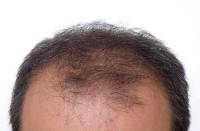Hair loss and stress are inexorably linked. The rigors of modern life are often at fault. With no time to relax, job and family pressures and poor diet, it’s no wonder hair loss and stress are closely related. Often there are medical conditions caused by stress and losing hair is a major symptom.
Scientific research has shown that hair loss and stress can effect healthy hair growth and retention because stress can alter the body’s ability to use certain trace elements and amino acids needed for hair growth. Experimental data has shown that stress can affect the hormone balance in the body, causing thinning and hair loss. Stress also contributes to narrowing of the arteries, which can restrict blood flow to the scalp, causing temporary shedding of hair. The loss will become permanent if the narrowing of arteries continues untreated. In most cases stress-related hair problems are reversible if the underlying cause is treated.
Click Here To Learn More About Hair Loss And Stress!
Often hair loss and stress are not seen as connected conditions. Sometimes stress combined with anxiety and/or depression. Small stressors, while seeming insignificant alone, can accumulate until the person experiences major symptoms. If you have undergone a significant upheaval in your life, like the death of a loved one or the loss of a job, you could experience delayed hair loss long after the event has passed. This condition is called alopecia areata and manifests itself as patchy hair loss. The stressful event causes some hair follicles to enter a dormant state for a number or weeks or months. After the dormant period, the hair falls out and the follicle ceases to produce hair. The immune system may also play a role in alopecia areata.
Diet can also be a factor in hair loss and stress. Often the pressures of daily life, work and family prevent us from eating a healthy diet. We tend to grab something on the run and don’t consider the long-term effects of a poor diet. Vitamin and mineral deficiencies have disastrous effects on hair. What seems like just dry, unmanageable hair could easily be a symptom of a severe nutritional deficiency? Unless the imbalance is corrected, diffuse hair loss can result.
If you suspect hair loss and stress in your life are related, take heart. This type of hair loss is usually reversible. Here are some tips to help you get the situation under control. First, try to exert some control over stressful events, rather than just allow yourself to be carried along helplessly. Do not allow yourself to be overwhelmed. If work is a stressor, learn to compartmentalize it — put a mental fence around it and don’t let it spill over into other areas of your life. Try to focus on the positive. Eat a healthy and varied diet rich in fruits and vegetables.
Exercise is a great stress reducer. Even a 20-minute walk 3 times a week will help. Take a multivitamin/mineral daily supplement. See your doctor about hair loss and stress. You may be suffering from a more serious condition like anxiety or depression. There are medications that can help.
Hair loss and stress are not easy to control, but it can be done. Resolve to make some positive changes in your life and you might be surprised to see your hair loss stop. And it won’t be long before regrowth starts and continues until you are fully recovered.

